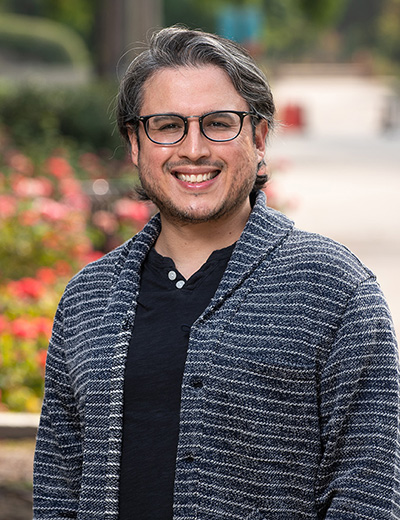Meet Robert Sanchez of philosophy, who specializes in Mexican/Latinx/Latin American philosophy, as well as existentialism. He also has interests in the philosophy of race, the philosophy of food and the history of philosophy.
Professionally, it has always been my goal to teach at a small, private liberal arts college, which I believe can offer the best overall education. Personally, coming to Oxy was coming home: I went to preschool in Eagle Rock before attending both Eagle Rock Elementary and Eagle Rock High School. Already, I feel a special commitment to the place, institution and community.
How has remote learning impacted your approach to teaching?
Remote learning has forced me to rethink everything, in terms of both the content of my courses and my style of teaching. Although I can’t wait to return to the classroom, I will eventually be glad that I was forced to ask hard questions about what is essential in this or that class, how to use technology to our pedagogical advantage, and how to connect to students regardless of the platform.
How have you been connecting to students?
I like to think of philosophy as a conversation, so to make sure my students and I have a meaningful discussion, and they with one another, I scheduled small tutorial groups (roughly five to six per group) throughout the week. Each group meets for roughly 40 minutes and I believe our class discussion is very close to meeting in person. Some students have expressed their appreciation for the hard work their professors are putting in, and though the situation is challenging and not ideal, I think we all have the sense that we’re doing our best and that we’ll get through this together.
What do you look forward to most about returning to campus?
People. I’m looking forward to the rhythm of campus life, to the extemporaneous discussion with a student as they catch me walking to my car, to office hours in an office, and to the sight of students struggling with the material together.
How do you balance your research with your teaching, and how much do the two intersect?
For me, I don’t distinguish between teaching and research. First, I teach only what I care about, all of which contributes to my research goals one way or another. (This is much easier to do at a place at Oxy.) Also, my research on Mexican and Latin American philosophy (my anthology and edited collection) has always been directed at making this woefully underrepresented tradition available and accessible to students in English. And to other scholars and professors, of course, but primarily to students.
To cite just one example of how my research and teaching overlap, this spring I’m teaching a CSP seminar titled “The Color of Humanity,” which will chart the history of dehumanization in Latin America and the philosophical theories that underwrite it, beginning with the conquest and colonization of the Americas and continuing today in all manner of exclusion based on the idea that some humans are not fully human (e.g., slavery, racism, anti-immigrant laws, police brutality, etc.). I am also starting a new book on the development of 20th-century Mexican humanism, which I will argue is a response to the legacy of the above history and which has the potential to theorize about what it means to be human, but do so in an inclusive key.

